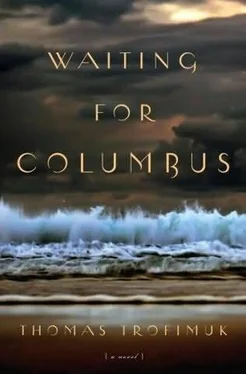If he’d told them about Iceland and the Norseman, and what those sailors said they saw twenty-one days out into the ocean, they might have considered his journey. That might have moved a few. The problem was withholding what needed to be withheld while revealing the right amount. Reveal the one wrong thing and he could become just another dead heretic, a potential special guest of the Inquisition. It seemed that offending behavior could come and go out of fashion with this holy tribunal. One week, converting to Christianity was fine; the next, it wasn’t good enough. One week, the official map of the known world was sacrosanct, not to be tinkered with, church doctrine. The next week, new ideas about the unknown world were entertained. It was difficult to stand on this shifting sand dune.
***
The first commission said his idea had merit. It was a bold scheme. A new sea route to the Indies and Japan, and especially one forged by Spain, was a grand idea. Going all the way around Africa was a long and expensive and dangerous journey. And it had only been done once, allegedly. But it wasn’t possible to sail across the Western Sea without dying of starvation or thirst. The second commission agreed with the first, in its own unique way. The bottom line: the world was too big, the ocean too wide, the ships too small to carry enough provisions.
“With respect, Your Honor,” Columbus says, “you have no clear evidence the world is that big.”
“Nor do you have any evidence that it’s any smaller. We do have science. Our country’s best minds.” Las Palos stands up. He’s a narrow man, with a large, humped nose and a full head of black hair that falls to his shoulders. “All these men”-he motions with his hand to a group of men sitting in the back row-“all these men, say you are wrong, that the Earth is vast. That the Western Sea cannot be crossed successfully. That you will only kill yourself and those who are foolish enough to sail with you.”
“I bow to these learned men. They have resources and knowledge of which I can only dream. But I have a question.”
“I think we’re done, Mr. Columbus.”
“Just one small question?”
Las Palos turns toward the back row. Raises his eyebrows.
“All right, but our minds are settled.”
“For the best minds of our time-because your intelligence is so dazzling-exactly how big is the Earth?”
Four men lean their heads together into a huddle. One man does not move but, rather, looks bemused.
After five minutes, Las Palos is obviously agitated. After ten minutes, he stands. “It is not our position to prove the size of the Earth, Mr. Columbus. It is, however, required that you prove your case to us. And we have doubts.” Las Palos pauses. A large man at the end of the back row clears his throat. Las Palos stops, turns toward the man, and nods. The man stands. He looks down at the papers in his hands. Then looks directly at Columbus. “Well, we do not know exactly how vast the planet is, but we believe it is larger than your, ah… estimate.”
“I want to suggest that one sure way to find out exactly how big the Earth is, is to sail out there and have a look. Somebody has to go out there and witness the ocean. Make notes on distance. Sometimes theories, fascinating as they may be, need to be proven. I am willing to-”
“Your price is too high,” Las Palos says. “You will have our official answer in a few days but I can almost guarantee the outcome. I can only speak for myself, but what you are proposing is, well, quite impossible.”
“With respect, how will you know for sure? Will you let Portugal discover new routes? Britain? France?”
“Enough.”
“Will we beg foreign powers for the charts? Is that what you envision for Spain? Is that your grand plan?”
“Enough!”
***
Newspaper stories of this audience, Columbus ’s second, report that as Columbus was leaving the commission chamber he turned and challenged anyone in the room to stand an egg on its end, on a marble tabletop.
“A thousand silver pesos to anybody who can do this thing,” he said. “Just take an egg and stand it on its end. It’s a simple thing.”
Eggs were sent for and four men attempted to make the egg stand on its end. Then two more tried to no avail. Columbus watched dispassionately. Las Palos had already disappeared into the back sanctums of the university.
“Impossible,” the men of the commission finally declared. “An egg can’t be balanced on one end-not on a flat surface. Utterly impossible!”
When Columbus took the egg, smashed one end-not hard enough to make it run-and stood it on the table, only Luis de Santángel, the queen’s treasurer, could be heard laughing hysterically in a sea of stunned silence.
Columbus had made an ally.
***
“Oh, my dear boy,” Cecelia says. “You are smiling, but there is sorrow in you as wide and deep as an ocean.”
“Well, I am here, in this so-called hospital of innocents, against my will,” Columbus says as he sits down. “Why would I be happy? How could I be happy?”
“No, no, no. It’s much bigger than that, Mr. Columbus.” She pats his hand. “This is loss, and guilt, and too much to bear.”
“Well, I’m afraid you have me at a loss. I don’t know what to say.”
“In time you’ll know,” she says. “There’s no rush. In the meantime, we can chat.” Cecelia hands him a cup of tea. “It’s green tea. It’s good for you.”
Columbus thinks about politely declining. He doesn’t drink tea. But with Cecelia it seems as if he should. Steam rises from the cup in minuscule swirls. Its scent is so singular-simple. He sips the tea and, surprisingly, finds it to his liking. This is not a complex flavor.
They are at a table in the dayroom-near the windows-Cecelia in her robes on one side, and Columbus, wearing only a pair of socks and an open housecoat, on the other. This is the first time they’ve communicated beyond casual nods in passing. Columbus has a few more sips of the green tea and is about to comment-to supply mindless dialogue-something about how he is pleasantly surprised at the taste of this tea. But he doesn’t. He turns inward against his impulse to fill the void of silence with his self-manufactured nonsense.
When the bird hits the window it shocks them. A loud, muffled bang, they turn, see nothing, both know immediately it was a bird.
“A sparrow?” Cecelia says. “Oh my dear God.”
“We need to see-maybe we can do something.”
“The doors are locked. We can’t get out.” She’s distraught. Her hand shakes as she points at the locked door.
“This is a rescue mission-a special circumstance.” Columbus stands. One of the new orderlies, a pimply-faced young man named Sylvester, follows him to the door. Columbus tries it and indeed it is locked. He yanks on it again, testing the veracity of the lock. He yanks on it again, harder this time.
“The courtyard is closed for the day,” the orderly says, stepping between Columbus and the door.
“Open it. A bird has hit the window-might be hurt, suffering.” Columbus looks around the room. They’re alone. A minor miracle in this institute. The fact it’s bingo night could account for the scarcity of inmates.
“The hours are there.” Sylvester points to a small square of white paper mounted on the wall. “The courtyard is closed. It’s late. I’m sure this bird is fine.”
Columbus leans in close. The orderly places his hand on his walkie-talkie, puffs up his chest, draws sternness to his face.
Columbus whispers, “By the time you get even remotely close to calling for help, I could do great damage to you, my friend. Now just open the door.”
Читать дальше











